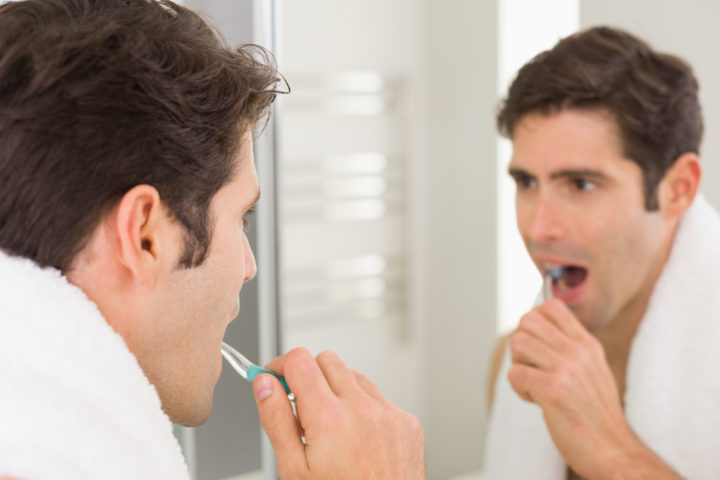It happens to many of us—blood in the sink after brushing. Many times, we shrug it off as something normal, but in fact, it’s not normal at all. Bleeding gums could be a symptom of a much more serious dental issue—one that should be evaluated by a professional dentist.
But don’t get too nervous! Typically, whatever is causing your bleeding gums can be easily treated by your dentist. The key is to visit your dentist as soon as you notice a problem so he or she can treat your dental issue conservatively and effectively.
Here are five health problems that could be causing your bleeding gums:
1. Gingivitis
The most common reason for bleeding gums is gingivitis—the mildest form of gum disease. When bacteria and plaque linger around the gum line, they can cause swelling, redness, irritation, and bleeding of the gums. Brushing your teeth can irritate your gums even more and cause them to bleed.
If this is what’s causing your bleeding gums, you can improve your oral hygiene by buying a soft-bristled toothbrush and using an antibacterial mouthwash. You should visit your dentist for a regular dental cleaning as well.
2. Periodontitis
Periodontitis is a much more severe form of gum disease. At this point, you may also be experiencing gum recession, excessive bad breath, an icky taste in your mouth, and a change in the fit of your bite.
This disease attacks the bone and tissue that support your teeth. If left untreated, periodontitis can lead to tooth loss. Fortunately, when you receive immediate treatment, your dentist will most likely be able to reverse your symptoms with a deep dental cleaning.
In some cases, more extensive treatments may be necessary.
3. Vitamin C and K Deficiencies
A nutritional diet is extremely important for maintaining a healthy mouth and body. Both Vitamin C and K have a tremendous impact on oral health, here’s how:
Vitamin C
Vitamin C, also known as ascorbic acid, is naturally present in many foods, such as:
- Oranges
- Potatoes
- Tomatoes
- Red and green peppers
- Kiwi
- Broccoli
- Strawberries
To get the most out of these foods, eat them raw. Heating may reduce the amount of Vitamin C. Appropriate levels of Vitamin C help reduce your risk of numerous health problems like cancer, heart disease, age-related macular degeneration, cataracts, the common cold, and gum disease.
Vitamin K
Vitamin K can be naturally found in:
- Spinach
- Asparagus
- Broccoli
- Legumes
- Eggs
- Strawberries
This nutrient is best known for blood clotting, maintaining healthy bones, and wound healing. Eating enough Vitamin K, along with proper dental care, can help strengthen your gums and stop bleeding.
4. Stress
It’s no secret that stress can lead to numerous health issues, and bleeding gums is one of them. Stress lowers your immune system and causes inflammation of the blood vessels, which leads to the breaking down of the soft tissues in your mouth. This is what causes your gums to bleed.
If stress is the cause of your bleeding gums, try doing one of these things to reduce your stress level:
- Do an outdoor activity for 30 minutes a day
- Take up a new hobby like crocheting, writing, yoga, dancing, or reading
- Talk to a therapist or counselor
- Avoid or reduce your caffeine, alcohol, and nicotine intake
- Get more sleep
- Say “no” to the unimportant requests, events, and responsibilities
5. Pregnancy
Women are much more susceptible to bleeding gums when they are pregnant because of increased hormone levels. To treat pregnancy gingivitis, try to:
- Maintain good oral hygiene
- Rinse with saltwater
- Use a mouthwash
- Rinse after morning sickness
- Visit your dentist
Pregnancy gingivitis typically goes away after pregnancy, so don’t be alarmed if the bleeding doesn’t stop right away.
Contact Your Dentist Today
Visiting your dentist is a crucial part of treatment for bleeding gums. Prolonging your visit can create more oral health problems and mean more expensive treatments. Call your dentist today to schedule an appointment.
To visit with our Lombard, IL dental team, call 630-629-5700 today.

